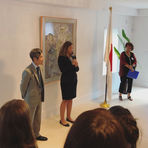top of page

JET PRogram
what it is

From 1987, the Japan Exchange and Teaching Program has been fostering international communication and cultural exchange between Japan and other nations for many years. The program sponsors non-Japanese people to live and work as an Assistant English Teacher in Japan, with the bulk of these ALTs coming from the United States.
As demonstrated in their criteria of not requiring a teaching degree, this program emphasizes cultural exchange above English teaching. With "foreigners" living and working inside communities and schools, Japan hopes to increase its citizens' exposure to other cultures and increase global awareness, all alongside improving domestic English education.
The picture to the left and the banner for this page are where it all began, at the Japanese consulate in Miami, FL. I was approached to give an impromptu speech to a crowd of some 70 fellow JETs, professionals, and diplomats. This set the tone for my entire JET experience, one of sudden surprises and valuable discomfort.
what I do every day

From a day-to-day basis, my actual job can look very different. What school I'm teaching at, having an ALT meeting, or planning for my adult English class can all drastically affect how my daily work unfolds.
Officially, I spend most days teaching English to children, grades K through 9. It is my responsibility to develop new materials and evaluate old ones, creating lesson plans which foster either independent teaching (only me) or co-teaching environments (me and a Japanese teacher of English). My lessons aim to make English learning accessible, relevant, and fun! My other responsibilities include co-teaching monthly classes with 7 other ALTs in my city, participating in a summer all day English camp, and hosting a local adult English language conversation class. Even with these various roles and responsibilities, I still occasionally find enough time to do something like craft four Christmas trees for four different classes out of construction paper!
As far as unofficial duties go, I consider the Program's emphasis on cultural exchange every day of the week. Simply showing up at my schools or a local cafe is enough to disrupt my small, rural community - thankfully, simply showing up has never been my talent. Working hard to forge connections with students, with those who will shape Japan's future relations with other countries, is extremely important to the JET Program. This translates to me acting as an incredibly casual diplomat of sorts. I take part in local cultural events, from soba-making classes to English Nights at a local bars to a Yellowtail Festival. In return, I answer questions about life in America and work responsibly, positively normalizing "foreigners" for the people I see everyday - coworkers, students, even curious grandparents at the grocery store.


why teach with jet


There are a lot of ways to travel, to see the world and help others. Based on my academic background and experience, some people show confusion when they hear that I've become an assistant teacher. Based on my academic background, one might expect me to pursue local opportunities in environmental policy.
I had several priorities in applying to the JET Program. My first priority was living abroad. After studying abroad in Europe, I wanted to experience an immersive life in a non-Western country. I wanted an international experience that wasn't a series of shallow dives, but instead one massively deep plunge. I wanted to be uncomfortable, put in a place with a culture I was only passingly familiar with, all so I could challenge the limits of my abilities and talents. It is incredibly important to me to have a broad, complex worldview, and participating in this program has done just that and beyond.
Sadly, my second biggest concern had been earning a paycheck that would help me start to pay back student loans that I and many others carry out of undergrad. Many humanitarian organizations do amazing, important work in vulnerable communities, and while I still plan to volunteer abroad in such places, directly after graduating could not be my time for such an adventure.
My third and most compelling reason for joining the JET Program was to gain valuable teaching experience. I strongly believe that teachers are some of the most influential and under-appreciated members of U.S. society, and their skillset is unparalleled. They can captivate an (oftentimes unwilling) audience, have the ability to explain extremely complex topics in accessible ways, and have planning/coordination down to a science. These skills are something I greatly wanted to develop; I had gotten a sample of this with my UAA internship and the mentorship I performed with the SNRE SC, but I wanted to go even further.
In considering future academic and career opportunities, the skills I have developed on the JET Program are a huge asset. Working between 5 different schools with an average of 25 teachers at each, collaborating with one to six English teachers a day, and teaching upwards of 130 students on an average Monday, my flexibility and adaptability have improved by leaps and bounds. I have gained experience in intercultural communication, office work, leadership, independence, time management, cultural sensitivity, lesson creation and facilitation, collaboration, presentation, organization, event planning, and most of all, adaptability.
At the end of all this, what matters most to me is that I understood other people more, their capacity to work hard and tirelessly, and recognizing that is likely the most valuable skill of all.



Below is an album of some of the photos I have taken during my time in Japan. Feel free to look through them and watch my journey unfold.

bottom of page























